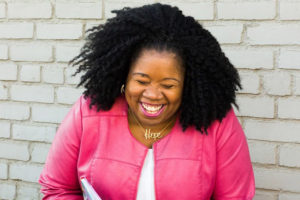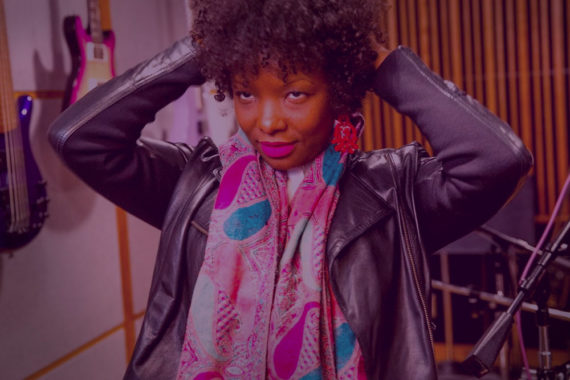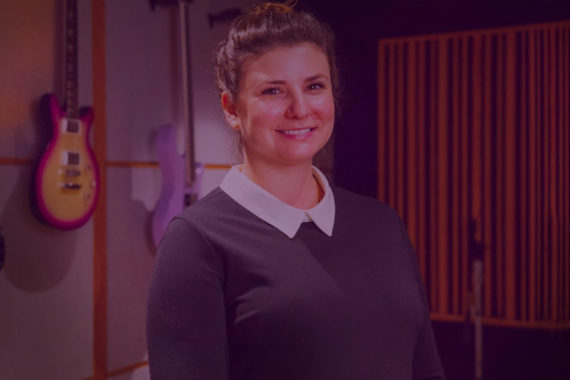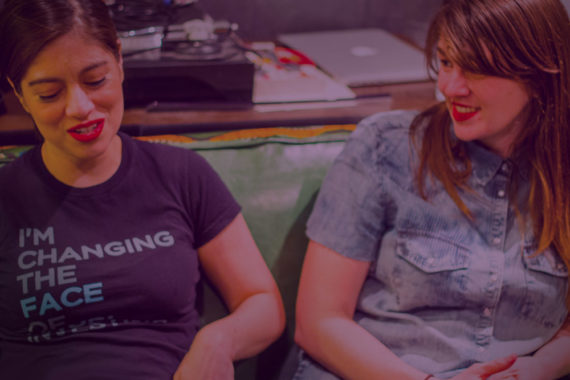
Dina Tate, Founder and CEO, Global Girls Squad
(photo credit: Kat Araujo)
Natalia gets the 60-second pitch from Dina Tate of Global Girls Squad, which works to “create, promote, and publish chapter books for young girls of color.” In the Legal Minute, Mitzi Chang of Goodwin has tips for hiring a lawyer. Plus, this week’s Investor Take from Ruth Ann Harnisch of The Harnisch Foundation.
Music courtesy of Seven Seas Music (a Pipeline Angels portfolio company!)
EPISODE TRANSCRIPT
Natalia: Hi everyone, my name is Natalia Oberti Noguera. I am the Host and Creator of Pitch Makeover and I’m also the Founder and CEO of Pipeline Angels, where we are changing the face of angel investing and creating capital for women and non-binary femme social entrepreneurs.
Gina: And I’m Gina Delvac, the Founding Executive Producer of Pitch Makeover. We’re taking the concept of a fashion makeover and applying it to startup pitches. Entrepreneurs pitch, we talk, and then we share some feedback on what they should keep, delete, and maybe even more important—add to their pitch. Our goal—help more voices, as Rihanna says, shine bright like the diamonds that they are.
And after the Pitch Makeover we have the Legal Minute with Mitzi Chang of Goodwin, answering burning startup legal questions, followed by First Pitch. And stay till the end for this week’s Investor Take from Ruth Ann Harnisch of The Harnisch Foundation.
[1:00]
Natalia: Well, Dina Tate, Founder and CEO of Global Girls Squad, thank you so much for joining us here at Pitch Makeover.
Dina: Thank you.
Natalia: Are you ready…to pitch?
Dina: I think I am.
Natalia: Yes, you are! Okay. Ready? Set? Go!
Dina: In 2014, of the thirty-five hundred children’s books that were published, only one hundred, seventy-nine were about African Americans. Today I present to you…Global Girls Squad. We will create, promote, and publish chapter books for young girls of color. Our flagship series is entitled “Lizzie and Mackenzie’s Fabulous Adventures.” Ta-da!
Natalia: Yay!
Gina: Twenty-seven seconds!
Natalia: Okay. Awesome.
Dina: Give me money!
[Both laugh]
Natalia: Okay, okay. So, awesome [2:00]. Thank you. So…let’s talk a little bit. So you mentioned that out of US$3500—this was in 2015?
Dina: Of thirty-five hundred children’s books that were published.
Natalia: Thirty-five hundred children’s books…published, only one-seventy-nine were about—
Dina: African Americans.
Natalia: African Americans. Tell me a little bit more about—how big is the children’s book publishing industry?
Dina: It’s a US$27B revenue, and chapter books is comprised of US$495M within that industry.
Natalia: US$27B is the entire publishing industry or *children’s*?
Dina: Children’s books.
Natalia: Children’s books. So—okay. And then…what is a chapter book?
Dina: So a chapter book is advanced more than a picture book. So, it includes heavy illustrations just like a picture book, but includes a lot more text [3:00]. It has more chapters to it and so it’s what they call when you’re ready to get to your “big boy, big girl” level. So, you’re beyond picture books, you don’t want those little readers, you’re ready to advance more, you’re feeling more encompassed to want to try a bigger book, but you’re not ready for middle grade yet.
Natalia: Okay.
Dina: So, we’re hitting that little sweet spot for six to nine year olds. So, like, the Harry Potters of the world, those—that’s…middle grade. We’re younger where we’re more of the Rainbows Girls, if you’ve ever heard of that book. We’re more in that genre. We’re more like, from third grade to fifth grade. And then like from fifth grade on, that’s more of the middle grade YA because those chapters are a lot more thick, less illustration. Where mine is more heavily illustrated, the text is a lot larger.
Natalia: How would you describe how big your market is?
Dina: But the market [4:00] for young girls of color is huge and what was sad was that there was a period from 2000 to 2013 where there was a lot of chapter books being published for young girls of color, and then it stopped. And then all of a sudden you didn’t see where they were coming from. So, it’s just funny now there’s—because of this lack of diversity, people wanting to see more books representing them, now there’s more of an outcry of people wanting to see more of what…represents them. So, even when it’s trying too hard—trying to find a book for a young girl of color, you—you can’t find one. It’s very hard to find. You have to go to Barnes & Noble and they’ll say, “Oh, we have to order it for you.” You can’t automatically just go and find it on the shelf where you can find “Ivy and Bean” on the shelf. You can find some other chapter books, but when you’re trying to find something for people of color, it’s nearly impossible. And either it’s out of print or it may—you have to go on Amazon. It may not be on Amazon, you may have to—it’s really sad. [5:00]
Natalia: Okay and especially when I’m thinking of April Rains, you know, #OscarsSoWhite.
Dina: Mm-hmm.
Natalia: Or there’s the #WeNeedDiverseBooks.
Dina: Mm-hmm.
Natalia: Or is it Marley Dias?
Dina: Yeah.
Natalia: Who did the 1000—
Dina: Black Girl Books, yeah.
Natalia: Yeah, like so—so there are a lot of voices out there and there seems to be, as you’re saying, like, there’s like an additional spotlight—*needed* spotlight to—to, you know, have things change. And like Marian Wright Edelman say like “You can’t be what you can’t see.” So—
Dina: Right.
Natalia: There’s this huge *need* for us to, like, *see* ourselves. Right? Like, and, I have three categories keep, delete, and add. In the keep, guess what? I want you to keep *everything* that you currently have!
Dina: [Indistinct] Okay.
Natalia: When it comes to delete, don’t delete anything! I do have some stuff that I would love for you to add to your pitch. I’d love for you to include in your pitch the *market*. You mentioned that it’s a US$27B revenue market [6:00] and you also mentioned that when it comes to *chapter* books *within* the children’s book publishing market that it’s a US$495M market. You know, like, those are pretty big numbers and it really would strengthen your case on why the time is now that we should be supporting Global Girl Squad. The *other* part I’d say is describe and define what *chapter* books are by giving examples. You know, you mentioned “Rainbow Girls,” right? And then, why is it a sweet spot? You know, when you mentioned chapter books you said, “it’s that sweet spot for six to nine year olds.” And so, why is that that a sweet spot? And then, it would be awesome to include in your pitch, why now? Marley Dias’ #OneThousandBlackGirlBooks, #WeNeedDiverseBooks, all of these movements are happening right now. And so, this could be a really fantastic opportunity for you to showcase [7:00] that this is the right moment, this is the right time for Global Girls Squad.
Okay. So are you ready?
Dina: I gotta do it right now?
Natalia: Yeah! Okay, you are ready, Dina.
Dina: I stay ready, so I don’t have to get ready!
Natalia: Love it!
[Both laugh]
Natalia: And on that note, Dina. On that note, ready? Set? Go!
Dina: In 2014, of the thirty-five hundred children’s books that were published, only one hundred and seventy-nine were about African Americans. Chapter books have a…oh, no…chapter books have a US$495M revenue, overall the book publishing industry is a US$27B revenue. Marley Dias created “One Thousand Black Girl Books” because she could not find books that she could relate to. She said she was tired [8:00] of reading about boys and their dogs. Today, I present to you Global Girls Squad. We will create, publish, and promote chapter books for young girls of color. Our flagship series is entitled “Lizzie and Mackenzie’s Fabulous Adventures.”
Gina: Forty-nine seconds.
Natalia: I will give you an extra shout-out. You came—I remember Global Girls Squad before Marley Dias actually made the rounds. Do you agree with me? Weren’t you…?
Dina: Of course!
Natalia: Global Girls Squad, you know, is inspiring on its own, and you can leverage the fantastic movement that Marley has done, right? At the same time, you came up with a fantastic concept, you know, before that, right? So, I just wanted you to know that, we see you. My take on your second—on your Pitch Makeover, I *loved* how you were able to bring both why this is—why you’re passionate about this, you know, like, and why it’s important. And also why it makes sense [9:00]. So, thank you for, you know, like, integrating the feedback. And thank you also for, like, integrating your passion. You know, that’s something that, like, you can’t give someone. They either have it, or they don’t. How about you give me your take on what you thought about, like, the…the Pitch Makeover.
Dina: I appreciated it because I always think about the numbers, I keep forgetting the numbers are so important. The passion is good, but you’ve got to tell the market share of why it needs to be there. Because if you—even if you have the problem and the solution, you gotta tell about that data. If you don’t bring the data to the table, nobody’s going to give you that money.
Gina: Next up is the Legal Minute with Mitzi Chang. Stay tuned after that for First Pitch.
This is the Pitch Makeover Legal Minute. I’m back with Mitzi Chang from Goodwin. Hi, Mitzi. How do I know if the lawyer that I—who’s recommendation I found on Yelp, or from my friend, I’m an early stage entrepreneur [10:00], how do I know that they’re good? What are the questions I should be asking?
Mitzi: I think for most lawyers there will be a website of their law firm, or their… maybe it’s a solo proprietorship that they’re their own lawyer. I think that you can look through their biography and get a sense for the types of clients that they have and the type of work that they do. I think that asking many questions about, you know, what—how do they work with entrepreneurs? Do you have—what was the last deal that they did? What are the common problems that similar clients like yourself might have to deal with? All of those questions, I think, can give you a good idea of how much experience your lawyer might have in the space that you’re looking for. So they might be an amazing lawyer in another space, but they may not have the market knowledge that’s so important when you’re representing entrepreneurs.
Gina: Thanks, Mitzi.
Mitzi: Thank you.
Gina: This has been the Legal Minute on Pitch Makeover. And now we’re back with Dina Tate and our segment First Pitch. [11:00]
Natalia: Tell me about the first pitch you ever gave.
Dina: That was *way* back in…two-thousand-and-something-or-other with my first startup BlackBridalGuide.com. That was a wedding resource website for African Americans. And so, I—at Pace University they had a—a pitch contest and I actually wore a African styled wedding dress and I had a wedding broom. So here I am, coming up doot-doot-doot-doot-doot, with the wedding dress swinging around with a wedding broom, and people are like, “She’s going to win! She’s going to win!” No! I took second place. I was *devastated.* I was just—I was like, “Really now?! I came through all this and I lost?!” But, no, but the experience was good because the crowd was behind me. But the dude that came up with his—the guy that won—he never came—his—the ideas hasn’t even…flourished. So I kept my…site up for, like, eight years. So at least I did something with my little second place money, and I saw the site flourish and do it’s thing. And I finally shut it down. But he never went anywhere with his. But it felt good to do that first pitch and I went with—for [12:00] the gusto and I wore the wedding dress.
Natalia: Do you remember what the feedback was?
Dina: One older white dude, he owned…the Oreck vacuums? He was one of the judges. He was like, “I just don’t get this thing.” Everybody else gave me *positive* feedback, he was just, “I don’t get this” and just shut me down. But everybody was like, “I get it. I understand it. It makes sense. You know, just polish it up a little bit with the—with the business plan,” and that was pretty much it.
Natalia: And do you remember—what—what about the first pitch that you gave for Global Girls Squad?
Dina: That was with you.
Natalia: Oh!
Dina: And lord-y I was nervous!
Natalia: In Atlanta?
Dina: Yes! [Natalia laughs]
[Whispers ]Oh I was nervous, I was…
Because it was going for the gusto again. But I was so nervous, I was like [makes heart thumping sound]…and, you know, when you practice, you have it down. You’ve got the minutes down, yup, what you want to say. But I still [inhales sharply]…[13:00] I felt like I choked and I didn’t do well. But I got so much good feedback. Even afterwards, people were writing me afterwards. When the book was published, some people bought the books. So, to me it was a win-win. So even though I didn’t win, I still won because I’m right in front you right now. So, to me it looks like I still am winning because the feedback was really amazing.
Natalia: Yeah, it’s the network, right?
Dina: Yeah.
Natalia: It’s…and tell me about—do you remember what—what sort of feedback, like, you got?
Dina: One of the people said I needed to add someone that already had self-published already because when I went through the process it was so hard, so I understand why she said I had to add that. And then another one was saying how I need to take—whenever I go out to different book fairs I need to go back and find out how many people were in attendance versus how many I sold.
Natalia: Mmm.
Dina: So even though it may not look bad, it just says “this is the number of turnout.” It just stands out better [14:00] when you just say, “Oh! I sold a lot of books, a lot of people was there.” So what? Anybody—everybody can say that. But if you say that over five thousand people was there and say these how many people came to my—take attendance of the people that show up at my—my booth, that helps out. So just—you just break it down the best way. So, like, it may be the numbers might drop, but at least it shows there was traffic there and some level of interest. So, I never thought about things like that, like taking attendance as people are coming up to me, and things like that.
Natalia: You know, and I love that we’re ending on this note, because, you know, today’s Pitch Makeover Tip I’d say is context. It’s spell it out. It’s break it down, like you said. So context, spell it out, break it down.
Thank you so much for joining us, Dina!
Dina: Thank you!
Gina: This season’s Investor’s Take is brought to you by Ruth Ann Harnisch and The Harnisch Foundation. And today’s Investor’s Take is: watch the clock, which we’re doing right now, Natalia [15:00].
Natalia: You know how much easier these investor takes started being once we had, like the time in front of us? [Laughs]
Gina: Once we’re watching the clock! We’re taking our own time seriously.
Natalia: I will say also, that oftentimes, when people are thinking of watching the clock, is they are thinking of not going over and the other thing that we have also learned through our Pitch Makeover podcast sessions with our fantastic more voices entrepreneurs is, “Hey! If you get a minute, use the whole minute because—don’t leave time on the table because you might not have a second chance.” So leverage the time you have and don’t underutilize it.
Gina: Thanks again to Ruth Ann Harnisch and The Harnisch Foundation for this season of Investor Takes.
Natalia: Hey, leverage, we have four more seconds!
Gina: I know! I didn’t know what else to say!
[Both laugh]
Natalia: Thanks, Ruth Ann!
[16:00]
Gina: Subscribe to Pitch Makeover anywhere you’re listening right now including Google Play or Apple Podcasts where we’d love for you to leave us a review. More information and show notes are at pitchmakeover.com and we’re everywhere on social media @PitchMakeover.
Natalia: Thanks for joining us. This has been Pitch Makeover. Now go out and take over!



